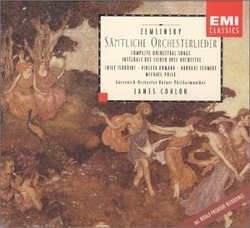Zemlinsky--Complete Orchestral Songs
Dr. Christopher Coleman | HONG KONG | 10/16/2000
(5 out of 5 stars)
"The music of Gustav Mahler and Richard Wagner echoes strongly in Alexander Zemlinsky's orchestral song Waldgensprach (Forest Talk). Zemlinsky is a little-known link in the line of Austrian/German lied composers stretching back to Schubert and through Richard Strauss. In a short time at the end of the 19th century, this musical world produced Gustav Mahler and Hugo Wolf, then Richard Strauss, Alexander Zemlinsky, and Arnold Schoenberg in succession. That Zemlinsky's works, few as they are, do not feature prominently in the modern repertoire is not for their lack of quality--Zemlinsky was a great composer, but unfortunately he wasn't a great composer often enough. His oeuvre consists of eight operas, three symphonies, and a relatively small number of chamber ensembles and songs--in fact, also like Mahler, Zemlinsky spent a large portion of his professional life as a conductor, which must have been a contributing factor in his limited compositional output. But when Zemlinsky is at his best, as in his Lyric Symphony, or in his Two Songs for Baritone and Orchestra, his work is as fine as any of his contemporaries, and this is a highly recommended CD for fans of the genre.There is an oddity of this CD, though: although it is titled the Complete Orchestral Songs, it includes a fragment of a song cycle and a song for soprano and string sextet, both of which were abandoned by Zemlinsky uncompleted. Resurrecting the music of forgotten composers is one thing; but resurrecting the incomplete works of forgotten composers strikes me as a rather odd thing to do, although in this case, it works. The song for soprano and string sextet, originally intended as a companion piece for Arnold Schoenberg's Verkarte Nacht, is a beautiful work worthy of attention. The "Grand Gesture" is not the only thing that Romantic music is about, and Zemlinsky is as compelling with the intimate caress as with the passionate spasm.This more intimate approach, again probably derived from Mahler in his Das Lied Von Der Erde, is featured in one of the most interesting pieces on the disc, the Symphonic Songs, op. 20. These songs are based on the poetry of African-American writers of the `Harlem Renaissance' about the black experience in America, particularly the experiences of oppression and death. These poems must have resonated strongly in Zemlinsky, who had recently lost his wife and who was soon to be forced to emigrate to America as a result of Nazi oppression. The cycle ends with a tremendously haunting scene of a white girl holding and kissing a black baby as they smile at one another on a beautiful summer day, while the corpse of a black man hangs from a tree, silhouetted by the sun. The poem is made all the more haunting by the simple language used--we are left to ourselves to feel the horror of the scene rather than having the details of the death grimace on the dead man's face told in exacting detail; and Zemlinsky captures this effect perfectly."
A stylish, moving collection...
Eric D. Anderson | South Bend, IN United States | 02/21/2003
(5 out of 5 stars)
"One often reads in reviews of Zemlinsky's works that he didn't "change with the times". This must certainly be code for "didn't copy his friend Schoenberg by writing atonal music", because, as this album amply demonstrates, Zemlinsky's style definitely underwent a metamorphosis. The first song, "Waldgesprach", written in the late 19th century, reminded me strangely of "Erlkonig" by Schubert, though with obvious echos of Wagner. The second, accompanied by string sextet, is filled with Tristanesque chromaticism. But it's with the "Two Songs for Baritone and Orchestra" that the album really starts to take off, and to sound like the Zemlinsky of later years. The famous Maeterlinck songs are jewels. They rank among his greatest masterpieces--archetypes of the 20th century romantic art song. Every detail has been lovingly thought out and put in it's place. The orchestration is startlingly original, and the harmonies filled with compelling strangeness. The texts, too, are fascinating fragments that are melancholy and evocative. The "Symphonic Songs" premiered 16 years later than the Maeterlinck songs, and are typical of Zemlinsky's later style--less lush, and filled with dark, unsettled harmonies. I do prefer his middle period, but there's still much about this group that is compelling, and the music suits these dark poems about the suffering of slaves in "Dixieland", with references to lynchings, domestic violence, etc. There are few composers who can compete with the richness of Zemlinsky's art, and this album is a catalogue of that richness."


 Track Listings (17) - Disc #1
Track Listings (17) - Disc #1